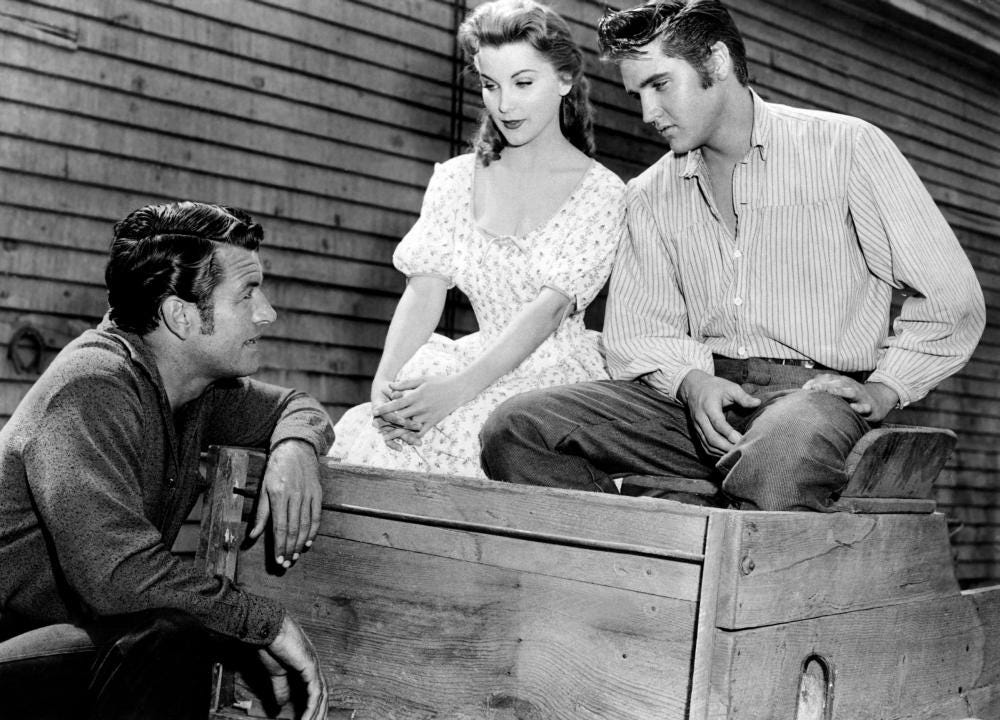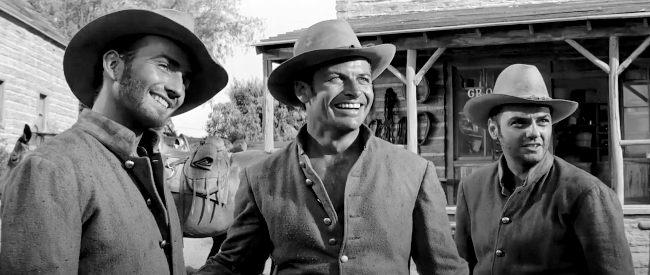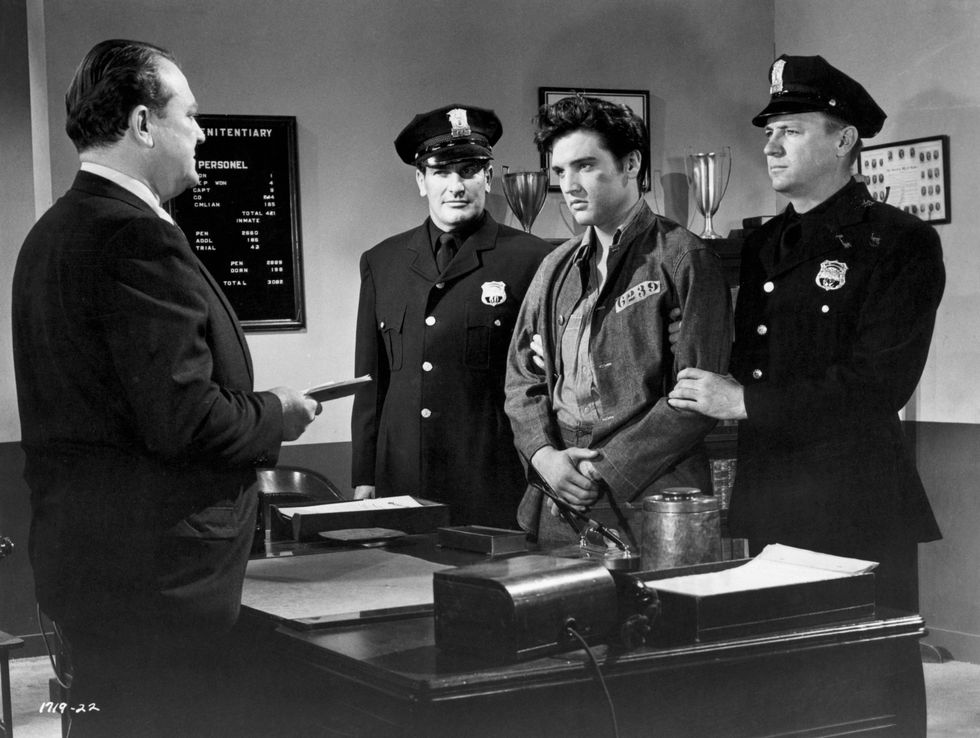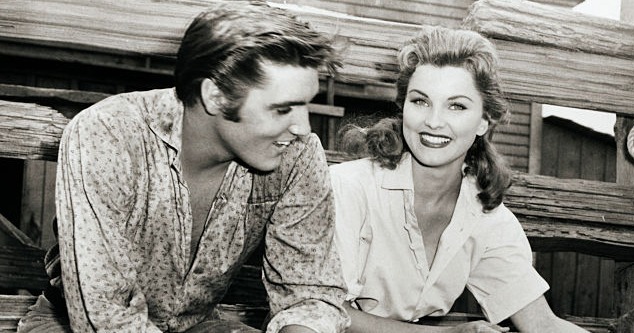Elvis Presley is a name synonymous with musical greatness, and his presence in cinema cemented his place as a pop culture icon. One of his most significant early film roles was in Love Me Tender, which was released in 1956. This romantic drama marked Elvis’s debut on the big screen, allowing him to showcase his undeniable talent beyond his musical career. The film’s impact is undeniable, but beyond its charm and Elvis’s stellar performance, there are a few hidden details and amusing mistakes that might surprise even the most dedicated fans.

Elvis Presley’s Film Debut in Love Me Tender
Love Me Tender wasn’t just a movie—it was a cultural event. When the film premiered at the Paramount Theater in New York City, thousands of Elvis’s fans camped out to catch their first glimpse of him on the big screen. The premiere was an event that embodied the rock star’s immense influence. The theater was filled with excited screams and fervent admiration as audiences celebrated the King of Rock ‘n’ Roll, marking the moment as an unforgettable pop culture milestone.
Elvis’s role in the film was pivotal, not only due to his fame but because of his talent as an actor, which was yet to be widely recognized. His portrayal of Clint Reno, the youngest of the Reno brothers, demonstrated his natural charisma and charm. The movie was set against the backdrop of the American Civil War, with a storyline that blended romance, drama, and Western themes.

The Title Change: From The Reno Brothers to Love Me Tender
Interestingly, Love Me Tender was not initially called by that name. Originally titled The Reno Brothers, the movie’s name was changed to capitalize on the success of the title song, “Love Me Tender,” which was performed by Elvis. The song became an instant classic and was closely tied to the film’s promotion, driving interest and curiosity from both Elvis fans and moviegoers.
The film loosely draws inspiration from the infamous Reno Gang, a group of outlaws known for their train robberies during the 1860s. This makes Love Me Tender the only film in which Elvis portrayed a historical figure. While the Reno Gang was notorious, their criminal exploits were ultimately ended by the actions of vigilante justice—a theme subtly reflected in the film.

Elvis’s Early Film Career: A Dream of Acting
Before Love Me Tender, Elvis had aspirations of being a serious actor, not just a musician. He had worked as a cinema usher in his youth, where he watched Hollywood legends like James Dean, Marlon Brando, and Tony Curtis. This exposure to classic cinema fueled his dream of becoming an actor, though his manager, Colonel Tom Parker, had other plans. Parker envisioned a strategy that would intertwine Elvis’s music and movie careers, ensuring that soundtracks became a key part of the films’ success.
Elvis, however, took his role seriously. Despite not being initially cast for the lead role, he was determined to prove himself. He memorized all of his lines, along with the lines of the other actors, in an effort to deliver the best performance possible. His dedication to acting earned him praise from producer David Weisbart, who described him as “humble, polite, and very serious about acting.”

Hidden Details and Bloopers in Love Me Tender
While Love Me Tender remains a beloved film, it is not without its behind-the-scenes surprises and unintentional bloopers. One of the most notable details is a continuity error regarding Elvis’s hair. In the final scene of the film, a silhouette of Elvis is shown singing “Love Me Tender” during the end credits. This scene was added after the original ending, which saw Elvis’s character, Clint Reno, tragically die. At the time of the reshoots, Elvis had dyed his hair black, but in the majority of the film, his hair is light brown, leading to an obvious inconsistency.
Another amusing blooper occurs when the Reno brothers attempt to convince former soldiers to hand over money. In the scene, a gun is alternately hidden and exposed as the camera angle shifts, creating a humorous continuity mistake. Furthermore, during a sequence where a Confederate soldier zips up a pair of pants, a noticeable anachronism appears—zippers had not yet been invented at the time the film is set.
Fans of Love Me Tender can also spot a modern car parked in the background during a scene where Cathy Reno (played by Debra Paget) is crying at a window, an odd historical error that seems out of place in a film set in the 1860s. Additionally, when Elvis performs “We’re Gonna Move,” the sound of his guitar continues to play even when he is no longer strumming it, adding an unintentionally humorous touch to the scene.
The Story Behind “Love Me Tender”
The iconic title song, “Love Me Tender,” wasn’t originally written for the film. The melody is based on a Civil War-era ballad called “Aura Lee,” a song that was widely known in the 1860s. The lyrics, which were penned by Vera Matson and her husband, Ken Darby, were reworked to create the version that Elvis made famous. Despite Elvis’s minimal lyrical contribution to the song, he is often credited as a co-writer, which has been a point of contention among some music historians.
The song was first performed by Elvis on The Ed Sullivan Show on September 9, 1956, well before the film’s release. This performance created a frenzy, leading to over a million advance orders for the single, which went on to become a gold record. It held the number-one spot on the charts for five weeks and became one of Elvis’s signature songs, remaining part of his setlist for decades.
Elvis’s Relationship with Debra Paget
Debra Paget, who starred opposite Elvis in Love Me Tender, was another fascinating part of the film. As a young actress, Paget was admired for her beauty, which even Elvis found mesmerizing. Their first meeting occurred on The Milton Berle Show, where Elvis famously shocked viewers with his gyrating dance moves during his performance of “Hound Dog.”
Although Debra was initially hesitant about meeting Elvis, she was soon charmed by his kindness and respectful demeanor. According to Paget, Elvis proposed marriage to her after they worked together on the film. However, Paget turned him down, citing her family’s disapproval of the marriage. She eventually went on to marry billionaire and film producer Howard Hughes, but the connection between her and Elvis was undeniable.
Elvis’s admiration for Debra Paget’s beauty extended beyond their professional relationship. In fact, it is said that Priscilla Presley, Elvis’s later wife, modeled her hairstyle after Paget’s iconic look in the film.

The Unchanged Ending and Elvis’s Mother’s Influence
Love Me Tender initially had a tragic ending, in which Elvis’s character dies. However, Elvis’s mother, Gladys Presley, and many of the film’s fans found this conclusion upsetting. The producers, responding to the negative feedback, added a scene of Elvis’s silhouette singing “Love Me Tender” during the credits, giving the film a more uplifting finish.
This change is just one example of how Love Me Tender was shaped by fan reactions and Elvis’s influence, showcasing the deep connection between the actor, his audience, and the film industry.
Conclusion
Love Me Tender is not just a significant film in Elvis Presley’s career, but also a timeless piece of Hollywood history. From the behind-the-scenes details to the minor bloopers that add charm, the film remains a testament to Elvis’s diverse talents. It’s a reminder of his incredible impact on music and film, solidifying his legacy as not just the King of Rock ‘n’ Roll, but a multi-faceted performer who captured the hearts of audiences worldwide.
